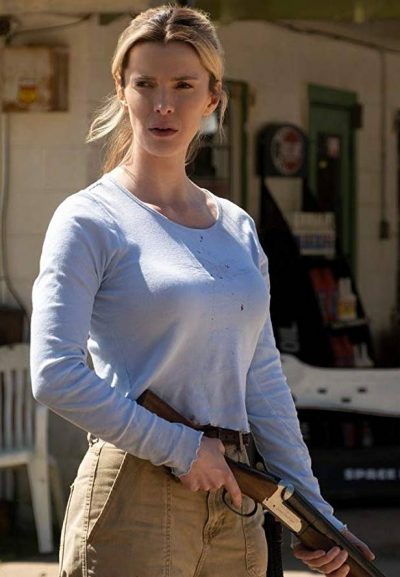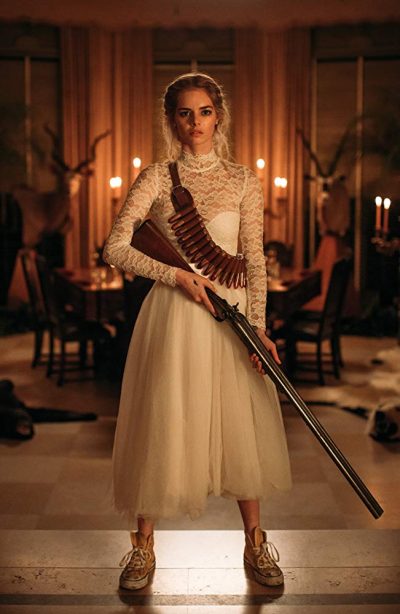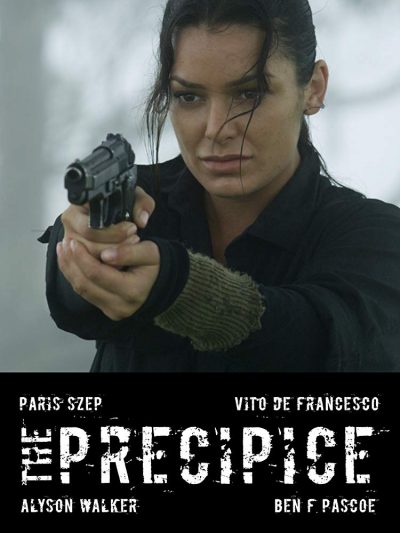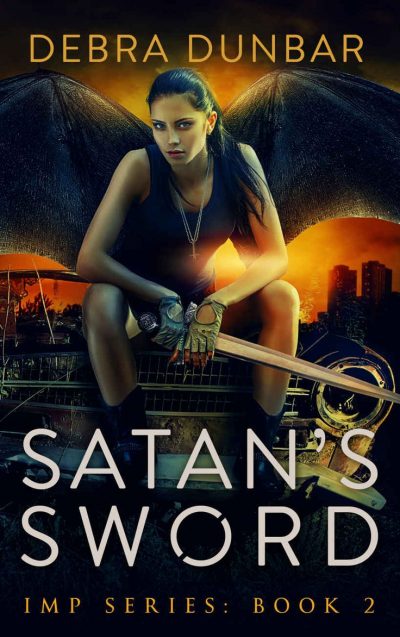★★★★
“Don’t believe the political hype.”

 This was a genuine and pleasant surprise. The original release was pushed back due to some severe controversy: not many films get Tweeted about by the President of the United States, who stated this was “made in order to inflame and cause chaos.” Needless to say, the studio ended up riding that publicity when the movie eventually came out. The current pandemic ended up trumping that (pun intended), so the film hit the home markets, just a week after its theatrical release. To my surprise, it’s considerably more nuanced than the “Red State vs. Blue State” concept I expected. And Gilpin has clearly put her GLOW training to good use, becoming quite the thirty-something bad-ass here.
This was a genuine and pleasant surprise. The original release was pushed back due to some severe controversy: not many films get Tweeted about by the President of the United States, who stated this was “made in order to inflame and cause chaos.” Needless to say, the studio ended up riding that publicity when the movie eventually came out. The current pandemic ended up trumping that (pun intended), so the film hit the home markets, just a week after its theatrical release. To my surprise, it’s considerably more nuanced than the “Red State vs. Blue State” concept I expected. And Gilpin has clearly put her GLOW training to good use, becoming quite the thirty-something bad-ass here.
It is, at its heart, another variant on The Most Dangerous Game, with a dozen people being kidnapped from their everyday lives, and taken somewhere that looks much like Arkansas, to be hunted by the rich for sport. The film is very good in the earlier stages at disconcerting the viewer by shifting their focus: you’ll settle in with one character, only for them to be wiped out in brutal fashion. Gilpin’s character, Crystal Creasey, isn’t even seen until more than 25 minutes in. But she makes up for her late arrival in no uncertain style, quickly establishing that the people behind the hunt, led by Athena (Swank), might have made a mistake by selecting Crystal as their entertainment.
What I found interesting is how even-handed this is. Yes, it’s about the elite hunting common people, and on its surface, i.e. the trailer, could be seen as Democrats hunting Republicans. But they’re hardly depicted as heroic, and indeed, it turns out, there’s considerably more to this. The whole thing started as an off-colour joke by Athena that got out, causing the wrath of #CancelCulture, as propagated through social media and conspiracy circles. She then decided, if we’re going to be blamed for something we didn’t do – why not do it anyway, and targets those who were her harshest critics on social media? Neither side gets out unscathed: not the liberals with their virtue signalling and hypocrisy, nor the conservatives with their paranoia and self-deceit. Yes, it is certainly guilty of picking at the raw scab which is the divided state of the nation (something for which the media, in general, must take much of the blame).
But the horror movie as social commentary is something that has been around for at least fifty years, since Night of the Living Dead. As I’ve previously made clear, I’m fine with that, providing the film works regardless. And you could safely ignore all the satirical aspects, and you’d still have something among the upper tier of movies inspired by The Most Dangerous Game. It all builds to a kitchen battle between Crystal and Athena, that for sheer savagery, is one of the best woman-on-woman brawls I’ve seen since Kill Bill, Volume 2. Providing you are not too blinkered in your political views, the payoff here should be worth putting them to one side for ninety minutes.
Dir: Craig Zobel
Star: Betty Gilpin, Ike Barinholtz, Amy Madigan, Emma Roberts





 This may be a first, in that the heroine here is non-human – contrary to what you (and, indeed, I!) might expect from the cover. I think I may have covered various crypto-humans before, such as vampires or elves. But this is likely the first entirely alien species. I began to suspect on page 1, when I read that Sah Lee “sank her pin-sharp teeth through the thick fur of the calf’s throat, and tasted the sweet metallic tang of its young blood.” This is clearly not your average twelve-year-old. And so it proves. The story really kicks under way two years later, when Sah Lee leaves her rural village on the planet of Aarn to attend school in the city of Aa Ellet.
This may be a first, in that the heroine here is non-human – contrary to what you (and, indeed, I!) might expect from the cover. I think I may have covered various crypto-humans before, such as vampires or elves. But this is likely the first entirely alien species. I began to suspect on page 1, when I read that Sah Lee “sank her pin-sharp teeth through the thick fur of the calf’s throat, and tasted the sweet metallic tang of its young blood.” This is clearly not your average twelve-year-old. And so it proves. The story really kicks under way two years later, when Sah Lee leaves her rural village on the planet of Aarn to attend school in the city of Aa Ellet. When I settled in to view this, I didn’t realize it starred Weaving, who was the best thing about the very entertaining
When I settled in to view this, I didn’t realize it starred Weaving, who was the best thing about the very entertaining  Regardless of its flaws, this does at least show that comic-book adaptations needn’t involve superheroes and Thanos snaps. This is instead a crime story, beginning towards the end of the seventies in Hell’s Kitchen, a working-class area of New York. Following a failed armed robbery, the husbands of Kathy (McCarthy), Ruby (Haddish) and Claire (Moss) are sent to jail, leaving the wives to fend for themselves. To make ends meet, the trio begin to move in on the territory of local boss Little Jackie, who has been taking money from local businesses, without delivering the promised protection. When Jackie goes after them, he is killed by the women’s ally, Gabriel (Gleeson), who begins a relationship with Claire. But the husbands’ return to Hell’s Kitchen looms on the horizon, as the women’s growing power also brings them unwelcome attention – both from the authorities and the Mafia who dominate the city.
Regardless of its flaws, this does at least show that comic-book adaptations needn’t involve superheroes and Thanos snaps. This is instead a crime story, beginning towards the end of the seventies in Hell’s Kitchen, a working-class area of New York. Following a failed armed robbery, the husbands of Kathy (McCarthy), Ruby (Haddish) and Claire (Moss) are sent to jail, leaving the wives to fend for themselves. To make ends meet, the trio begin to move in on the territory of local boss Little Jackie, who has been taking money from local businesses, without delivering the promised protection. When Jackie goes after them, he is killed by the women’s ally, Gabriel (Gleeson), who begins a relationship with Claire. But the husbands’ return to Hell’s Kitchen looms on the horizon, as the women’s growing power also brings them unwelcome attention – both from the authorities and the Mafia who dominate the city. This takes place in the Indian city of Delhi, and despite the title and the poster, is really about two policewomen, almost equally. Title billing goes to Soni (Ohlyan), a young officer who is coming to terms with life after divorce from her husband, Naveen (Shukla). She is also the possessor of a fierce temper, which repeatedly gets her into trouble because she’s unable to keep her cool with suspects. Forced to play clean-up is her boss, superintendent Kalpana Ummat (Batra), who seems to see something of her younger self in Soni, as well as appreciating the junior cop’s potential. But there’s only so far she can protect Soni from the consequences of her outbursts.
This takes place in the Indian city of Delhi, and despite the title and the poster, is really about two policewomen, almost equally. Title billing goes to Soni (Ohlyan), a young officer who is coming to terms with life after divorce from her husband, Naveen (Shukla). She is also the possessor of a fierce temper, which repeatedly gets her into trouble because she’s unable to keep her cool with suspects. Forced to play clean-up is her boss, superintendent Kalpana Ummat (Batra), who seems to see something of her younger self in Soni, as well as appreciating the junior cop’s potential. But there’s only so far she can protect Soni from the consequences of her outbursts. There’s nothing wrong, as such, with a film playing its hand close to its chest. However, you’ve got to give the audience enough information to keep them interested, and wanting to find out more. It’s here that this movie fails entirely, doggedly remaining so reluctant to tell you anything, I wanted to strap it down in a chair and start waterboarding. We don’t even get names for anyone involved, it’s that willfully unforthcoming. This begins in the aftermath of a shoot-out at a wind-farm, from which there are apparently only two survivors: a woman (Szep) and her captive (de Francesco). They head across the rural terrain towards a rendezvous with her allies, pursued not only by the captive’s allies, but also other interested parties.
There’s nothing wrong, as such, with a film playing its hand close to its chest. However, you’ve got to give the audience enough information to keep them interested, and wanting to find out more. It’s here that this movie fails entirely, doggedly remaining so reluctant to tell you anything, I wanted to strap it down in a chair and start waterboarding. We don’t even get names for anyone involved, it’s that willfully unforthcoming. This begins in the aftermath of a shoot-out at a wind-farm, from which there are apparently only two survivors: a woman (Szep) and her captive (de Francesco). They head across the rural terrain towards a rendezvous with her allies, pursued not only by the captive’s allies, but also other interested parties.
 The first volume in the Imp series,
The first volume in the Imp series,  I’ll confess, the headline above is a bit click-baity. This is perhaps closer to a female version of The Frighteners, the early Peter Jackson film in which Michael J. Fox could see dead people, and had to learn to work with them. The conduit in this case is Rika (Yanagi), a young woman who has been able to see ghosts since a young age. But an encounter with a trio of ghosts, all murder victims who are seeking revenge on their killers, opens a whole new realm. For, it turns out, whenever Rika is in a life-threatening situation, the spirits can take physical form. They can also draw energy from her, which can be used to create weapons, which range from the merely strange (the “meat hammer”) to the bat-shit insane. None more so there, than that of Akari (Mikado). She has a tendency to go into puppy mode when stressed, which involves her becoming… a bit licky. So inevitably her weapon transforms Akari’s hand into Grudge Dog, capable of ripping the face off her opponent.
I’ll confess, the headline above is a bit click-baity. This is perhaps closer to a female version of The Frighteners, the early Peter Jackson film in which Michael J. Fox could see dead people, and had to learn to work with them. The conduit in this case is Rika (Yanagi), a young woman who has been able to see ghosts since a young age. But an encounter with a trio of ghosts, all murder victims who are seeking revenge on their killers, opens a whole new realm. For, it turns out, whenever Rika is in a life-threatening situation, the spirits can take physical form. They can also draw energy from her, which can be used to create weapons, which range from the merely strange (the “meat hammer”) to the bat-shit insane. None more so there, than that of Akari (Mikado). She has a tendency to go into puppy mode when stressed, which involves her becoming… a bit licky. So inevitably her weapon transforms Akari’s hand into Grudge Dog, capable of ripping the face off her opponent. It’s always nice when a film manages to surpass expectations. Coming in, I was thinking this was going to be nothing but a low-rent, dubbed, caped crusader flick. And, to be honest, that is exactly what it is: a low-rent dubbed, caped crusader flick. But it proved considerably more entertaining than, say, Terminator: Dark Fate, which I saw the same weekend, and which cost roughly a thousand times as much to make.
It’s always nice when a film manages to surpass expectations. Coming in, I was thinking this was going to be nothing but a low-rent, dubbed, caped crusader flick. And, to be honest, that is exactly what it is: a low-rent dubbed, caped crusader flick. But it proved considerably more entertaining than, say, Terminator: Dark Fate, which I saw the same weekend, and which cost roughly a thousand times as much to make.